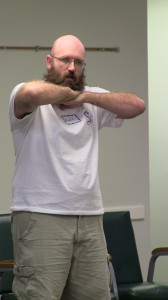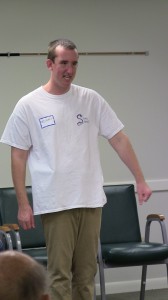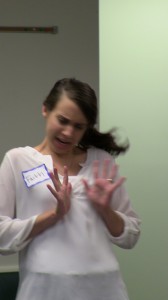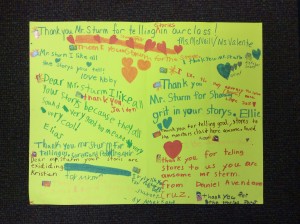 May your holidays be filled with wonderful stories, of lands far away, magical adventures, and family extravaganzas. Tell stories together….it builds community, shares your beliefs and values, and helps develop our sense of wonder in this incredible world we share. Be safe and have happy times. – Story Squad
May your holidays be filled with wonderful stories, of lands far away, magical adventures, and family extravaganzas. Tell stories together….it builds community, shares your beliefs and values, and helps develop our sense of wonder in this incredible world we share. Be safe and have happy times. – Story Squad
Yearly Archives: 2014
Story Squad Meets Sir Readalot
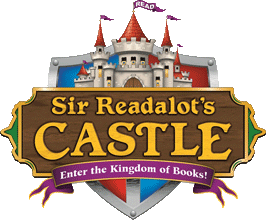 Storytellers from Story Squad joined the Estes Hills (Chapel Hill) Elementary School Scholastic Bookfair with the theme of Sir Readalot’s Castle. We shared stories from Hungary, Myanmar, Scotland, and Native America (Lenni Lenape) to a group of 50 school children and their parents. Dueling giants, hiccupping royalty, an angry dragon, and a fearless crow featured in our stories.
Storytellers from Story Squad joined the Estes Hills (Chapel Hill) Elementary School Scholastic Bookfair with the theme of Sir Readalot’s Castle. We shared stories from Hungary, Myanmar, Scotland, and Native America (Lenni Lenape) to a group of 50 school children and their parents. Dueling giants, hiccupping royalty, an angry dragon, and a fearless crow featured in our stories.
“Told Under Frosty Moonlight” Winter Stories at UNC 2014
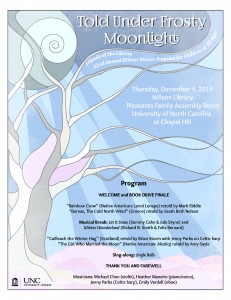 The 22nd annual Winter Stories at UNC-Chapel Hill was another rousing success. Children of all ages – and I mean ALL ages – showed up to hear stories, sing songs, eat candy and cookies, drink hot chocolate, and otherwise share time together as part of this wonderful community. The storytellers were “awesome” (to quote one young listener). Mark riddle told a Lenni Lenape tale about how Rainbow Crow helped warm the earth and melt the snow by obtaining fire, but in the process, lost his beautiful singing voice and charred all of his rainbow feathers black; however, if you look closely at a crow’s feathers in the sunlight, they still shimmer with all of the colors of the rainbow, his reward for his bravery and self-sacrifice. Sarah Beth Nelson shared a story about Boreas, the North Wind, and how we desperately wanted to marry Oreithyia, but she wanted nothing to do with him. He showed all of his power as he tried to impress her, but what impressed her the most was when he learned some humility and asked her to marry him, instead of demanding it. After a sing-along interlude, Brian Sturm and Jenny Parks (on Celtic harp) shared a story about the Cailleach, the winter hag of Scotland, and how she ruled over the land from the mountain of Ben Nevis. She captured Springtime and wouldn’t let her marry Summer, but eventually the two found each other and overthrew the Cailleach so warmth could return to the land. But only for a while, for she regains her strength and covers the mountains with her snowy fleece each year, warming people to put on their warm clothes and huddle by their fires until Spring and Summer can return. Amy Sayle then told a Native American Alutiiq story about the Girl Who Married the Moon by being able to keep her eyes closed for the entire journey to the sky world; but once there, she quickly got bored and went exploring. She found people lying face down and peering through holes in the ground with shining masks on their faces (stars), and then she went to the forbidden area of the moon’s home and found his moon masks. When he discovered her, he came to understand that she needed a purpose in the sky world, so the two of them shared the moon’s cycle.
The 22nd annual Winter Stories at UNC-Chapel Hill was another rousing success. Children of all ages – and I mean ALL ages – showed up to hear stories, sing songs, eat candy and cookies, drink hot chocolate, and otherwise share time together as part of this wonderful community. The storytellers were “awesome” (to quote one young listener). Mark riddle told a Lenni Lenape tale about how Rainbow Crow helped warm the earth and melt the snow by obtaining fire, but in the process, lost his beautiful singing voice and charred all of his rainbow feathers black; however, if you look closely at a crow’s feathers in the sunlight, they still shimmer with all of the colors of the rainbow, his reward for his bravery and self-sacrifice. Sarah Beth Nelson shared a story about Boreas, the North Wind, and how we desperately wanted to marry Oreithyia, but she wanted nothing to do with him. He showed all of his power as he tried to impress her, but what impressed her the most was when he learned some humility and asked her to marry him, instead of demanding it. After a sing-along interlude, Brian Sturm and Jenny Parks (on Celtic harp) shared a story about the Cailleach, the winter hag of Scotland, and how she ruled over the land from the mountain of Ben Nevis. She captured Springtime and wouldn’t let her marry Summer, but eventually the two found each other and overthrew the Cailleach so warmth could return to the land. But only for a while, for she regains her strength and covers the mountains with her snowy fleece each year, warming people to put on their warm clothes and huddle by their fires until Spring and Summer can return. Amy Sayle then told a Native American Alutiiq story about the Girl Who Married the Moon by being able to keep her eyes closed for the entire journey to the sky world; but once there, she quickly got bored and went exploring. She found people lying face down and peering through holes in the ground with shining masks on their faces (stars), and then she went to the forbidden area of the moon’s home and found his moon masks. When he discovered her, he came to understand that she needed a purpose in the sky world, so the two of them shared the moon’s cycle.
A special thank you to the musicians: Michael Chen (violin), Heather Maneiro (voice), Jenny Parks (Celtic harp), and Emily Vardell (oboe), who delighted the audience with introductory music and sing-along accompaniment. Also a heart-felt thank you to the folks behind the scenes who make this event possible each year: Liza Terll and Tanya Fortner. You two are the best!
5th Annual “Storytelling Under the Stars” at the UNC Morehead Planetarium
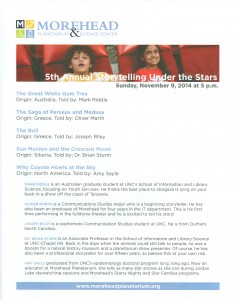 The tradition of sharing stories under the starlit skies continued Sunday, with the 5th annual “Storytelling Under the Stars” hosted by the UNC Morehead Planetarium and Science Center and featuring Story Squad. The audience was treated to stories from all over the world, starting in Australia, when Aussie storyteller Mark Riddle shared an Aboriginal folktale of the origin of the Southern Cross. First Man and First Woman were told by Baiame, the Sky God Creator, not to eat animals, but when the drought ruined all the vegetation, First Man speared a kangaroo, letting Death into the world. We then moved to ancient Greece, for two stories, the first about Perseus killing Medusa and rescuing Andromeda from the dreaded monster Cetus; the second about how Zeus wooed Europa in the form of a bull, commemorated by the constellation Taurus and the naming of one of Jupiter’s moons, Europa. We then traveled to Siberia for a story about the origin of the crescent moon (from the remains of a man torn in half in a tug-of-war between the Sun Maiden – who loved him – and Hosiadam, the evil sorceress, who wanted to eat him). At the end of the night, we returned to North America for a Native American tale of how Coyote threw shining stones into the sky randomly, rather than creating his own star picture from them, and now he howls at the sky in sorrow.
The tradition of sharing stories under the starlit skies continued Sunday, with the 5th annual “Storytelling Under the Stars” hosted by the UNC Morehead Planetarium and Science Center and featuring Story Squad. The audience was treated to stories from all over the world, starting in Australia, when Aussie storyteller Mark Riddle shared an Aboriginal folktale of the origin of the Southern Cross. First Man and First Woman were told by Baiame, the Sky God Creator, not to eat animals, but when the drought ruined all the vegetation, First Man speared a kangaroo, letting Death into the world. We then moved to ancient Greece, for two stories, the first about Perseus killing Medusa and rescuing Andromeda from the dreaded monster Cetus; the second about how Zeus wooed Europa in the form of a bull, commemorated by the constellation Taurus and the naming of one of Jupiter’s moons, Europa. We then traveled to Siberia for a story about the origin of the crescent moon (from the remains of a man torn in half in a tug-of-war between the Sun Maiden – who loved him – and Hosiadam, the evil sorceress, who wanted to eat him). At the end of the night, we returned to North America for a Native American tale of how Coyote threw shining stones into the sky randomly, rather than creating his own star picture from them, and now he howls at the sky in sorrow.
Orange County Literacy 30th Celebration features Story Squad
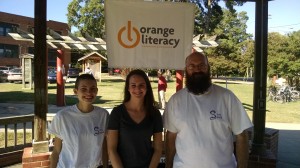 The 30th anniversary celebration of Orange County (NC) Literacy Council was a rousing success, with Maple View Farms ice cream, music by Bland Simpson, and stories by Story Squad. Over 250 people attended the 2-hour event. Indeed it was so popular that the organizers ran out of ice cream twice and had to run to Harris Teeter to restock. In the end, everyone had a great time under a gorgeous Carolina-blue sky and perfect temperatures. Storytellers Nan, Pressley, and Mark stole the show with their rousing renditions of folktales from around the world. Nan told a Hungarian folktale about a young boy who learns two magic words that help him marry the princess at the palace; Pressely shared an Argentinian story called, Medio Pollito, about a half-chick whose bravery and persistence win the day, and get him some wheat to take home to his family; and Mark shares a story from Myanmar about a dragon who is rudely awoken from deep slumber when a squirrel drops an acorn on his nose, and he has to trace back the real cause of the problem (rabbit’s twitchy nose).
The 30th anniversary celebration of Orange County (NC) Literacy Council was a rousing success, with Maple View Farms ice cream, music by Bland Simpson, and stories by Story Squad. Over 250 people attended the 2-hour event. Indeed it was so popular that the organizers ran out of ice cream twice and had to run to Harris Teeter to restock. In the end, everyone had a great time under a gorgeous Carolina-blue sky and perfect temperatures. Storytellers Nan, Pressley, and Mark stole the show with their rousing renditions of folktales from around the world. Nan told a Hungarian folktale about a young boy who learns two magic words that help him marry the princess at the palace; Pressely shared an Argentinian story called, Medio Pollito, about a half-chick whose bravery and persistence win the day, and get him some wheat to take home to his family; and Mark shares a story from Myanmar about a dragon who is rudely awoken from deep slumber when a squirrel drops an acorn on his nose, and he has to trace back the real cause of the problem (rabbit’s twitchy nose).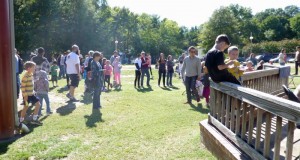
Charles House Tales
Once again, Story Squad regaled the seniors at Charles House in Chapel Hill with folktales from around the world. Storytellers Faith, Michael, and Mark took their audience on a reminiscence of childhood, with tales of the Three Little Pigs and Beauty and the Beast, and then they went into uncharted waters with a tale from Myanmar about a sleeping dragon and why the rabbit’s nose twitches. Everyone seemed to enjoy themselves thoroughly.
Crystal Coast Storytelling Festival 2014
 Story Squad was featured at the 2014 Storytelling Festival of the Crystal Coast in Morehead City, NC. We entertained 300 children from daycares and summer camps with folktales from around the world in the morning at the Crystal Coast Civic Center, and then in the afternoon, we shared tales with about 30 children and their families in the United Methodist church. In conjunction with the NC public library summer reading program, “Fizz, Boom, Read!” we shared stories that helped explain the natural world, answering that oft-asked question, “why?” Why does the water in the ocean rise and fall (because an old woman keeps picking up and putting back into the sea, a huge rock that blocks the ocean’s drain)? Why does coyote howl (because he tried to trick little dove and steal her song, but little dove tricked him into biting a rock, and he lost his teeth and howls because of the pain)? Why is coyote’s tail gray, why does squirrel’s tail arch over his head, why is chipmunk striped, why does frog have no tail, and why can you rub two sticks of the willow tree and get fire (because coyote and his friends stole fire from the Fire Beings and got scorched for their troubles)? Folktales give us an alternate view of the world….they were the stories people told, BEFORE we told the current story of science, in order to explain our world.
Story Squad was featured at the 2014 Storytelling Festival of the Crystal Coast in Morehead City, NC. We entertained 300 children from daycares and summer camps with folktales from around the world in the morning at the Crystal Coast Civic Center, and then in the afternoon, we shared tales with about 30 children and their families in the United Methodist church. In conjunction with the NC public library summer reading program, “Fizz, Boom, Read!” we shared stories that helped explain the natural world, answering that oft-asked question, “why?” Why does the water in the ocean rise and fall (because an old woman keeps picking up and putting back into the sea, a huge rock that blocks the ocean’s drain)? Why does coyote howl (because he tried to trick little dove and steal her song, but little dove tricked him into biting a rock, and he lost his teeth and howls because of the pain)? Why is coyote’s tail gray, why does squirrel’s tail arch over his head, why is chipmunk striped, why does frog have no tail, and why can you rub two sticks of the willow tree and get fire (because coyote and his friends stole fire from the Fire Beings and got scorched for their troubles)? Folktales give us an alternate view of the world….they were the stories people told, BEFORE we told the current story of science, in order to explain our world.
Talking “story” at the Environmental Literacy Center in Raleigh
 Story Squad met with nearly 30 environmental educators, teachers, and government resource people to share ideas about the benefits of storytelling in environmental education. Conversation was lively, as we shared “pourquoi” tales (stories of why things are as they are) from around the world to show how stories, despite not being “factually accurate” by modern scientific standards, are perceptions of the way nature works. Isn’t “science” the same thing…our current story about how nature works? We’re constantly changing this science story as we gain new knowledge, so it’s not “fact.” It’s just our best understanding at the moment. Perhaps that’s what folklore is, too? Our best understanding at that moment. So, while we can’t necessarily teach science with folktales, we CAN offer children a vibrant new perspective on their world with these stories, and they can introduce basic STEM concepts that will help children look at their world with new eyes and deeper vision!
Story Squad met with nearly 30 environmental educators, teachers, and government resource people to share ideas about the benefits of storytelling in environmental education. Conversation was lively, as we shared “pourquoi” tales (stories of why things are as they are) from around the world to show how stories, despite not being “factually accurate” by modern scientific standards, are perceptions of the way nature works. Isn’t “science” the same thing…our current story about how nature works? We’re constantly changing this science story as we gain new knowledge, so it’s not “fact.” It’s just our best understanding at the moment. Perhaps that’s what folklore is, too? Our best understanding at that moment. So, while we can’t necessarily teach science with folktales, we CAN offer children a vibrant new perspective on their world with these stories, and they can introduce basic STEM concepts that will help children look at their world with new eyes and deeper vision!
Rounding Out the School Year
 We finished up our weekly storytelling visits to Estes Hills Elementary School in Chapel Hill and Club Boulevard Humanities Magnet in Durham this week. What a marvelous time it’s been. The first graders at Estes Hills were a wonderful audience. They listened carefully, participated, and seemed to thoroughly enjoy the magical journeys we took them on. In particular they liked the African Anansi stories because “he’s such a trickster.” Trust children to love mischief! Brer Rabbit was another favorite for similar reasons. One of the joys of many folktales is that the underdog, outcast, powerless creature triumphs; children adore this particular metaphor to how they experience life (organized, told what to do, given rules, etc.). When the powerless character wins, the child listeners feel vindicated.
We finished up our weekly storytelling visits to Estes Hills Elementary School in Chapel Hill and Club Boulevard Humanities Magnet in Durham this week. What a marvelous time it’s been. The first graders at Estes Hills were a wonderful audience. They listened carefully, participated, and seemed to thoroughly enjoy the magical journeys we took them on. In particular they liked the African Anansi stories because “he’s such a trickster.” Trust children to love mischief! Brer Rabbit was another favorite for similar reasons. One of the joys of many folktales is that the underdog, outcast, powerless creature triumphs; children adore this particular metaphor to how they experience life (organized, told what to do, given rules, etc.). When the powerless character wins, the child listeners feel vindicated.
We told LOTS of stories at these two schools over the course of the year. Some of them are listed below:
- Origin of the Hopi (Native North America) – how the Hopi emerged from the underworld to life in this one
- One Day, One Night (Native North America) – how frog won the shouting contest over bear and others, so that we have one day followed by one night
- Ox and the Frog (Greece) – how frog tried to make himself as large at ox, with disastrous results
- Coyote’s Crying Song (Native North America) – when coyote keeps forgetting her song, Little Dove tricks him into biting a rock; coyote howls to this day
- Anansi and Guinea Fowl (Africa) – Trickster Anansi tries to get Guines Fowl to say “five,” but she’s too smart for him
- Mother of the Tides (East Africa) – how removing a plug in the bottom of the ocean causes the tides
- Abiyoyo (Africa) – how a clever boy and his grandfather use a guitar and a magic “disappearing” stick to overcome a ravenous giant
- Pheasants and the Bell (Korea) – an old woodcutter’s kindness in saving baby birds is repaid when the birds give their lives to save his
- Fishhook of Maui (New Zealand) – how the culture hero Maui fishes up the island of New Zealand using his grandmother’s magic jawbone for a hook
- Origin of Fire (Native North America) – coyote enlists the help of friends to steal fire from the monsters guarding it so people can stay warm
- Senor Coyote and the Dogs (Mexico) – coyote escapes from dogs chasing him until his pride causes his downfall
- Origin of Shoes (India) – when the king realizes the land is dirty, his advisor must find a way to keep the king’s feet clean
- Dancing Hyena (Africa) – Rooster uses an mbira to save his wife, Hen, from hungry hyena by making him dance
- Shark in the Milky Way (Hawaii) – the Milky Way is the remains of a giant shark thrown into the sky by culture hero, Ka-ulu
- Origin of the Rainbow (Native North America) – people and animals work together to blow spider into the Sky Kingdon to ask Old Man Above to stop the rain
- Anansi and the Moss-Covered Rock (Africa) – Trickster Anansi again tries to get animals to say special words so he can steal their food, but Mouse Deer outwits him.
- Cat’s Purr (West Indies) – cat accidentally swallows his special drum in anger over his friend rat’s lying
- Stonecutter (Indonesia) – When the stonecutter wants to be the most powerful creature in the world, he realizes he already is
- Ice Bear Child (Native North America) – when an old couple asks their polar bear child to hunt for them, their greed is finally their downfall
- Love Crystal (Vietnam) – a sad story of how love goes awry when it is based on pure fantasy
- Legend of Knockmany Hill (Ireland) – how Finn Macool defeats the giant Cuchullain by following his wife’s advice
- Dance for Water (Africa) – how rabbit is caught by a “tar baby” when he steals water during a drought (similar to the Brer Rabbit and the Tar Baby story)
- Anansi and Turtle (Africa) – Anansi won’t share his dinner with Turtle, so Turtle repays him in kind
- Lizard Loses His Farm (Africa) – Anansi makes a path to Lizard’s garden, claims ownership of it, then gives it back in exchange for a cloak made out of flies
- Rooster and the Diamond Button (Hungary) – Rooster gets his diamond button back from the Turkish Sultan with the help of his magic stomach
- Brer Alligator Meets Trouble (African American) – Brer Rabbit tricks Brer Alligator into meeting fire (trouble), charring his skin
- Why Heron Has a Crooked Neck (Africa) – Jackal bends Heron’s neck in anger of his saving Dove’s babies
- Peacock and the Puhuy (El Salvador) – Puhuy bird gives Peacock his beautiful feathers so he’ll be king, Peacock won’t give them back
- Senor Coyote Settles a Quarrel (Mexico) – When Rabbit takes rock off Rattlesnake and then wants to eat Rabbit, Coyote makes them replay the scene until Rattlesnake is again trapped
- Why Rabbit’s Tail is Short (Native North America) – Rabbit helps Wildcat capture Turkeys, and in revenge, Turkeys bite off Rabbit’s tail
- Origin of Butterflies (Native North America) – Creator makes butterflies from all the world’s colors, but lets birds keep songs; butterflies are beautiful but silent
- Origin of Maple Syrup (Native North America) – when people get too lazy eating maple syrup straight from the tree, Gluskabe adds water the trees; we must now work for our syrup
- Grandfather Bear is Hungry (Russia) – Chipmunk gets his stripes as a reward for feeding Grandfather Bear in the middle of winter
- It Could Always Be Worse (Jewish) – When a man believes his life is terrible, the rabbi helps him realize that it could be even worse
- Enormous Turnip (Russia) – the entire family can’t pull out an enormous turnip until they get the help of their animal friends
- Old One-Eye (North America) – woman outwits a band of robbers with the help of a dried up old fish she calls “Old One-Eye”
- Young Mouse and the Elephant (Africa) – Mouse believes he is stronger than Elephant, even after being shown otherwise
- Snow Bunting’s Lullaby (Siberia) – the bird snow bunting must fight to get his song back from crow so that his children will go to sleep
- Frog’s Hairball (China) – frog escapes tiger by challenging him to – and winning – a vomiting contest
- Green Gourd (North America) – woman gets thumped by a gourd that she picked too early, learning that ” you never pick a green gourd before it’s time or it’ll witch you sure.”
- Mother Scorpion Country (Honduras) – Naklili follows wife, Kati, into land of the dead, but cannot be happy there; unhappy alone in land of living, too, so he dies to rejoin his wife
And we got a special thank you from some of those students.
International Night at Wiley Elementary
Story Squad performed for the International Night celebration at Wiley International Humanities Magnet in Raleigh on May 9th. Three storytellers shared tales from:
- Germany: “The Three Spinners” is a story much like Rumpelstiltskin, in which a girl’s mother claims the girl loves spinning straw. When confronted with rooms full of straw, she enlists the help of three old women: one with a huge thumb, one with a huge lower lip, and one with an enormous foot. They spin the straw in exchange for her promise to invite them to the wedding. When the prince learns that they are disfigured from spinning, he insists that his new bride never spin again, and so the three spinners save the day.
- Africa: “Counting Leopard’s Spots” tells the tale of how vain leopard wants to know how many spots he has. Several animals try, but none can count high enough. Finally rabbit says that leopard has only two spots (light ones and dark ones).
- Russia: “Grandfather Bear is Hungry” is the story of a little chipmunk who gets his black stripes from Grandfather Bear’s claws after feeding him in the middle of winter when no other food could be found.
The kids thoroughly enjoyed the tales as part of the larger experience of International Night.

